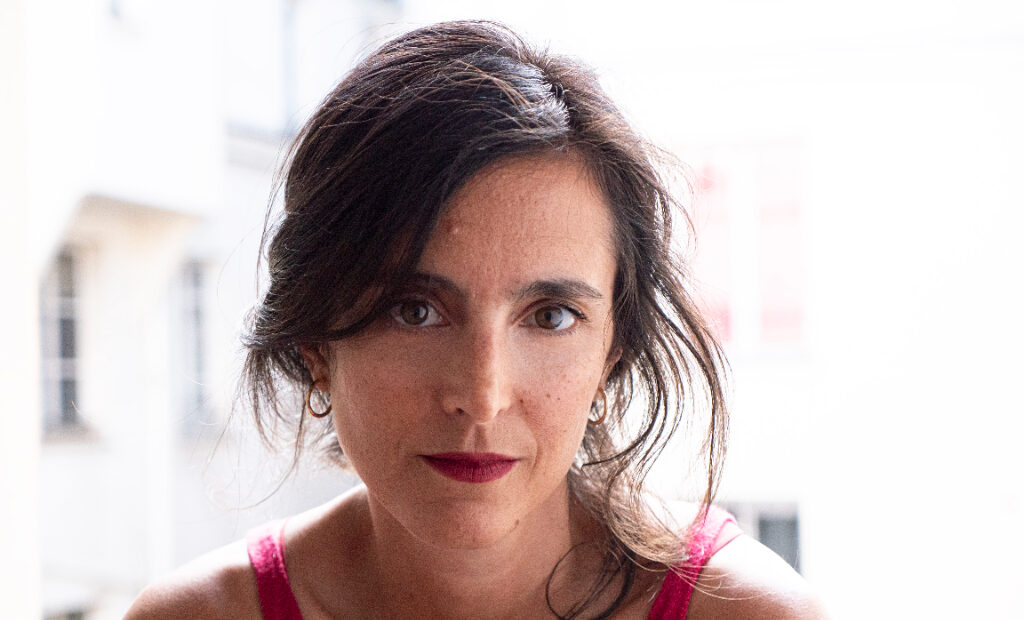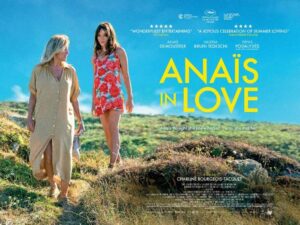“It’s by going to the intimacy of our own perspective that we can hope to then speak to a more general audience”: Charline Bourgeouis-Tacquet on Anaïs in Love

Anaïs in Love is a film imbued with a youthful, infectious energy. A charming, abundantly watchable outing, the feature follows its titular character, brought to the very picture of life by an effervescent Anaïs Demoustier, running around Paris in what seems like a constant state of tardiness, escaping the responsibility of her loveless relationship through casual affairs until one relationship with an older man (Denis Podalydès) turns into something much more profound, as Anaïs develops a connection to his wife, Emilie (Valeria Bruni Tedeschi).
The Upcoming had the good fortune to speak to Charline Bourgeouis-Tacquet about her debut feature, the inception of the project, creating from an auto-fictional perspective and the development of the film’s excellent score.
What was the initial inspiration behind the writing process?
I started working on this quite a long time ago. The idea was to set up a love triangle and to focus on this relationship between two women of different ages. This original setup, as with many things in the film, is inspired by my life and experiences. I had a relationship with somebody who was married to someone with whom I felt this association, this feeling that there were things in common and things to be searched for, so I felt that this was a dramatic possibility for a setup. Beyond that, I was interested in making a film on the topic of desire and the way in which people treat it as a motor in their lives. Lastly, I wanted to make a portrait of a young thirty-something woman. I think it’s a particular age where all decisions need to be made at once. There are questions about private life and romantic life, conjugality, having children or not having children and which career to try and accomplish. I think all of these things come into our heads. To do that, I drew on a lot of my experiences. It’s a film that’s altogether very close to me.
Does writing in that kind of autobiographical framework present challenges, or does it make the process easier?
I wouldn’t use the word autobiographical as much as self-auto-fictional. This is something that I’ve started being very open about in interviews because there is something of this truth which now seems interesting to share. It’s not a thing about being ashamed or wanting to hide the influence at this point in the process, but when I’m writing I’m quite disinhibited in the same way because I know that nobody can know the difference between the things that are fictionalised and the things that come from my life. It doesn’t feel so vulnerable in that sense either because I’m in a position where the auto-fictional part is what’s also keeping a space of comfort. I think in the end, it’s a lot less about the questions of the fictional or true events than looking for certain experiences and feelings from that source.
Do you think Anaïs is rooted in a uniquely modern, fast-paced anxiety, or do you think her problems are timeless?
To answer honestly, this is not a question that I had posed myself at any point in the writing, wondering how she would size up or go into a sort of generational ethos, so much as really write from my space and my perspective. Then again, I would say, and maybe it’s a bit of a banality, but it’s by going to the intimacy of our own perspective that we can hope to then speak to, I wouldn’t say universal, but at least a more general audience. In the ways in which her personality unfolds, I wouldn’t say Anaïs has atemporal problems. I think she is a young woman in a specific time and she is of this time, and that her impulsivity and her being in the present is definitely related to a world of short-sightedness, generally because of a difficulty to envisage a future, something that’s becoming more and more present around us in a sort of pre-apocalyptic feeling where it’s difficult to have any visibility on the horizon, and I think that is part of what informs her way of being.
The film mixes tones of spritely energy and contemplative poignancy. How did you find executing this balancing act?
The two registers that you point to were something that I was conscious of and working towards the entire time. I was interested both in exploring a space of comedy, which is something that I was more comfortable with, and then a second space of a more sentimental depth where other forms of gravity emerge and the relationship between them narratively can be simply separated in half. The first part of the film has a faster pace which is more on the comedic side where you have elements of this second tone that is about to come, and then the second half has the other dominant tone with elements of the first comedic one. That happens with the arrival of Emelie’s character, but it’s also because it’s the arrival of a certain kind of desire and all of these things which, to me, necessarily involve a change of rhythm and a change of pace which then unfolds to settle things slightly more. In the editing room, the choice was made to emphasise that difference, rather than try to smooth both registers in together; it was a point I came to to try and draw that line quite clearly.
The score is also interesting in that sense because it contains a blend of spikey, energetic piano pieces and more grand string arrangements. How important were the music choices in helping to conjure the film’s contrasting registers?
Yes, I wanted to talk about the music as part of that. I had originally not planned to have any original music. I was working with different things but the overall result lacked homogeneity. Certain things stayed like the Purcell piece, but otherwise, there was something kind of uneven which eventually made me have to then go and work with this composer who helped create this more homogenous, continuous feel. Because I am quite sensitive to melody, I called upon someone who is well established and, of the things he proposed to me, I kept the things that helped the unfolding of the sentimental aspect of the story.
Matthew McMillan
Photo: Noe Bach
Anaïs in Love is in UK cinemas and on demand on 19th August 2022. Read our review here.
Watch the trailer for Anaïs in Love here:

























Facebook
Twitter
Instagram
YouTube
RSS